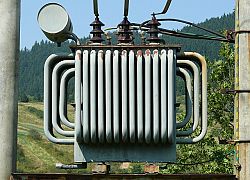

The Environmental Protection (Disposal of Polychlorinated Biphenyls and other Dangerous Substances) Regulations (Northern Ireland) SR 2000/232 were made in order to control the disposal of Polychlorinated Biphenyls (PCBs).
They were amended on 17 June 2025 by the Environmental Protection (Disposal of Polychlorinated Biphenyls and other Dangerous Substances) (Amendment) Regulations (Northern Ireland) SR 2025/111 in order to:
We've explained more about the changes below.
Background
PCBs are a group of 209 aromatic chlorinated hydrocarbons which used to be used in a range of products as heat transfer fluids, hydraulic fluids and as components in other equipment. As a result, they’re typically found in old electrical equipment such as transformers and capacitors. They were also used in the manufacture of various products such as printing inks and adhesives.
PCBs were popular because they were thermally and chemically stable. However, this stability, combined with the fact they are insoluble in water, means that once they are finished with, they do not break down in the environment. As such, they are persistent in the environment and can spread causing environmental harm and health issues.
Once they are present in the natural environment they can find, and have found, their way into the food chain. Unfortunately PCBs are toxic to animals and humans and are carcinogenic. As a result, in the 1980s many countries around the world began to ban or control the production, importation and use of PCBs in order to protect the environment and human health. The EU also began legislating with regard to persistent organic pollutants (POPs), including PCBs. The most recent legislation covering it is Regulation (EU) 2019/1021, on persistent organic pollutants.
Following Brexit, Northern Ireland is still subject to some, but not all, EU law. Regulation (EU) 2019/1021 is one such law that Northern Ireland still has to comply with, meaning national law has to be aligned with what the EU law says in this case.
What are the changes?
As a result of the amendments, the new requirements are as follows.
Transformers (including ancillary equipment such as radiators, bushings and capacitors) containing:
can be held until the end of their useful life, after which they must be decontaminated or disposed of as soon as possible.
Transformers containing:
can only be held until 31 December 2025, after which they must be decontaminated or disposed of as soon as possible.
What happens next?
One of the main changes here is the requirement to decontaminate or remove some transformers by 31 December 2025. As the amendments came into force on 17 June 2025, it means there is now a tight deadline to deal with applicable transformers.
This also impacts some transformers that, until 17 June 2025 were allowed to be held until the end of their useful life.
If you are in control of transformers containing PCBs, it is important to check the amounts of PCBs contained in the fluids in that equipment and act accordingly. Failure to meet the new 31 December 2025 deadline will constitute an offence which can lead to significant fines.